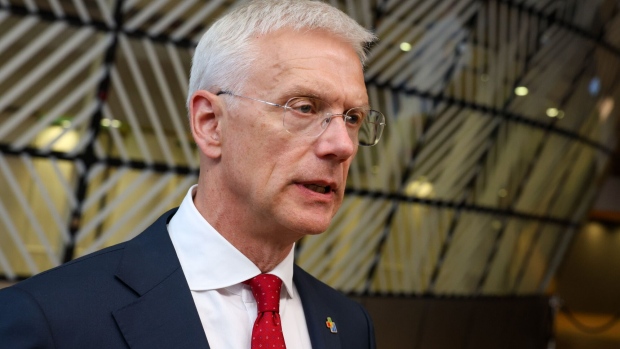Jul 18, 2023
ECB’s Doubts on Taxing Russian Assets Are Misplaced, Latvia Says
, Bloomberg News

(Bloomberg) -- Latvian Prime Minister Krisjanis Karins pushed back against the European Central Bank’s warning that taxing profits from sanctioned Russian central bank assets could undermine the euro zone’s financial stability, saying the plan would actually strengthen the bloc.
“We take the fight against money laundering extremely serious in that we completely overhauled our banking system” in Latvia, Karins said in an interview with Bloomberg News in Brussels. “And it seems somewhat odd to me to listen to the central banks saying that actually we should be friendly to any and all monies. I don’t think we should be — we’re not in Latvia. And why should the ECB be?”
The European Union has been sparring with the ECB over plans to tax windfall profits from more than €200 billion ($225 billion) in frozen assets to help with Ukraine’s reconstruction. The bloc’s executive arm had aimed to offer a plan this summer but the ECB’s warning has helped to delay that timetable.
Read more: EU Spars With ECB on Plan to Tax Sanctioned Russian Assets
Karins, who is attending a two-day summit of European, Latin American and Caribbean leaders which ends Tuesday, said that EU members are united on the political decision over a windfall tax.
“The differences are on interpretations of legality and legitimate concern for reputational risk,” he said. “But I would argue to the European Central Bank, the reputational risk is probably greater from not doing anything than doing something.”
Last week, ECB President Christine Lagarde told euro-area finance ministers that a windfall tax could undermine the euro and lead to a re-think among reserve holders, according to a person familiar with the meeting. She noted that the amount at stake was far greater than the few billions that the move would generate for Ukraine, before urging caution and saying that any decision should only happen if the Group of Seven is on board too.
Money Haven
“The stricter the ECB is on its upholding European values, I think that would enhance the value of the euro and Europe’s reputation among law-abiding democracies,” Karins said. “I could see it actually strengthening the stance of Europe because then Europe would prove that it is a principled value-based democracy, not simply a haven for anybody’s money.”
The frozen assets could generate some €3 billion in windfall profits, though some estimates suggest the figure could be even higher. Over half the assets are in cash and deposits, while a “substantial amount” of the remainder is in securities that will transform to cash as they mature in the next two to three years, Bloomberg previously reported.
©2023 Bloomberg L.P.







